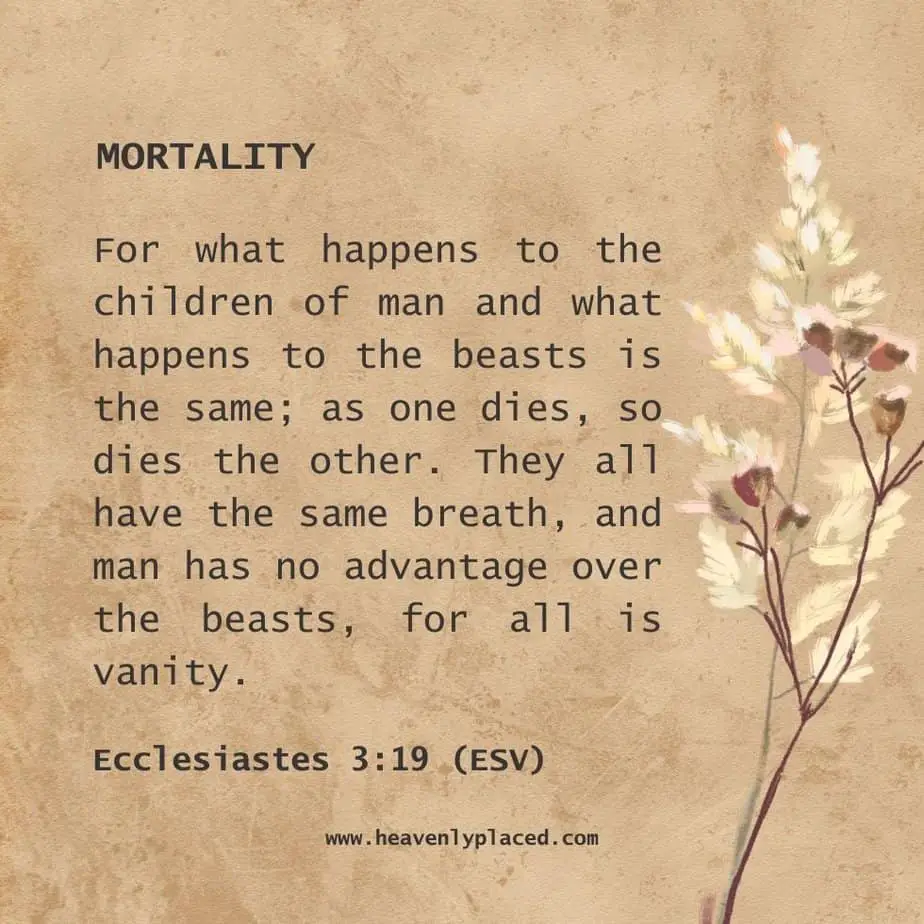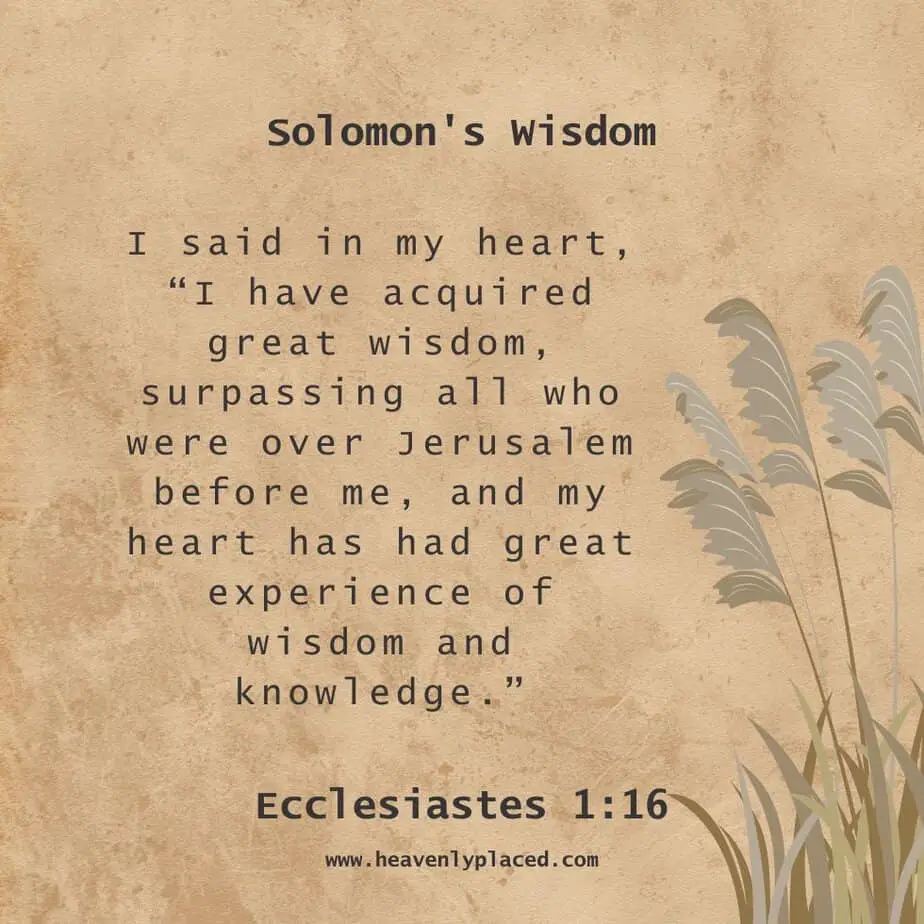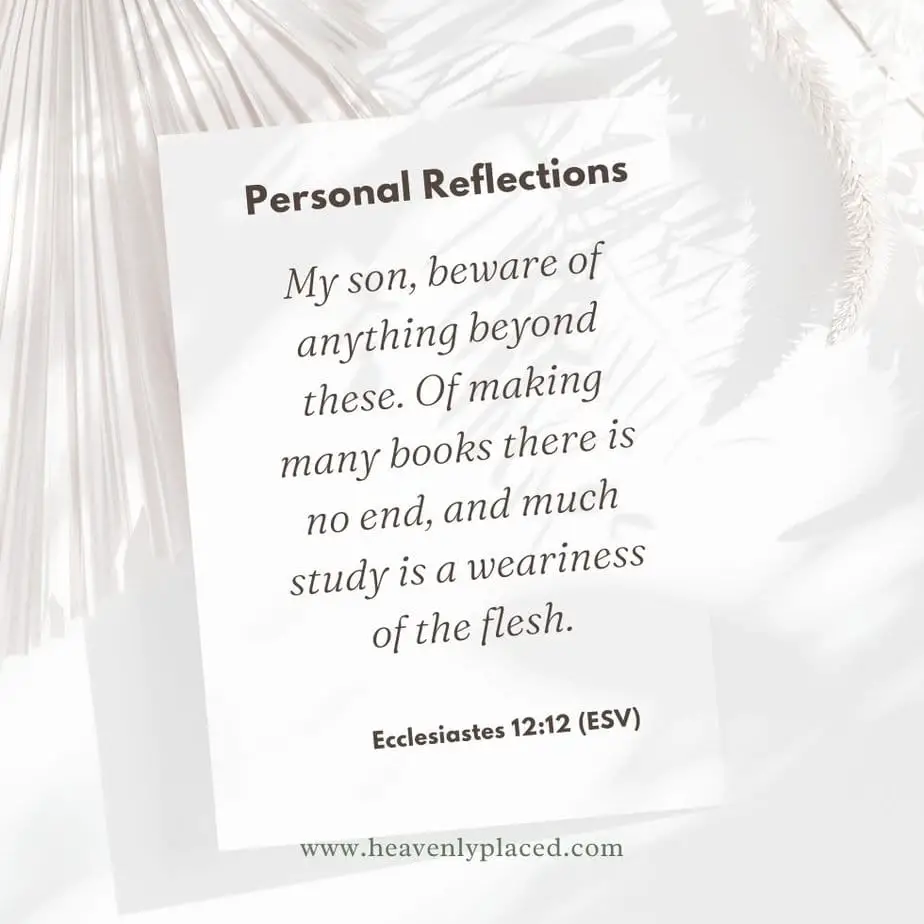Unlocking Wisdom: What Ecclesiastes Teaches Us About Life
This post may contain affiliate links. Read the full disclosure here.
Ecclesiastes is teaching taught by an “assemblyman,” which we would call a teacher or a preacher. This teacher/preacher is described as a son of David and a king of Jerusalem. So, traditionally, it’s accredited to the wisest man ever to live; King Solomon.
The Book of Ecclesiastes teaches us about life.
As we explore these teachings, we learn about the important questions of life, happiness, and wisdom. The book challenges the idea that wealth and material things bring true fulfillment. It also talks about the repetitive cycles of life, unfairness, and the importance of focusing on our spiritual lives and relationships. The book encourages us to look beyond temporary things and find lasting fulfillment in our spiritual connection and meaningful relationships. This article looks at each chapter of Ecclesiastes to understand its teachings and how they are still relevant today.
Chapters 1-3: Life Is Vanity
Vanity of vanities, says the Preacher,
vanity of vanities! All is vanity. Ecclesiastes 1:2 (ESV)
In these chapters, the Teacher from Ecclesiastes reflects deeply on the nature of life. He shares his observations that life can sometimes seem like it lacks meaning and purpose. He observes that no matter what we do—whether it’s working hard, building things, or finding enjoyment in life—these activities often seem to happen over and over again in predictable patterns, like seasons that come and go.
The Teacher also emphasizes that human wisdom, no matter how great, has its boundaries. We might be very knowledgeable and understand many things, but there are things in life that remain beyond our understanding. He tells us that life’s complexities and the reasons behind events are not always clear to us despite our best efforts to understand.
In these thoughts, the Teacher wants us to think about why we do things and what our life is all about. He wants us to see that there’s more to life than just what we know and do. Life has its own mysteries and cycles, and we should understand and accept that.
Chapters 4-6: Building Wealth Is Vanity
He who loves money will not be satisfied with money, nor he who loves wealth with his income; this also is vanity. Ecclesiastes 5:10 (ESV)
In chapters 4 to 6 of Ecclesiastes, the Teacher explores the pursuit of wealth and its implications on happiness. He discusses how many people dedicate themselves to gaining riches, believing that wealth will bring them lasting contentment. However, the Teacher points out a fundamental truth: despite all the effort and hard work put into gaining wealth, it often fails to provide true and lasting happiness.
He illustrates this by observing that material possessions and worldly success are fleeting. No matter how much wealth we get or how successful we become, these things are not permanent. They do not offer lasting satisfaction because they can be lost, taken away, or prove insufficient to fulfill our deepest needs.
The Teacher compares relying on material wealth for happiness to chasing something that continually eludes us. It’s like trying to grasp onto something slippery or constantly moving out of reach. He suggests that the pursuit of wealth can distract us from more meaningful pursuits in life, such as relationships, personal growth, and spiritual fulfillment.
Through these reflections, the Teacher encourages us to reconsider where we place our priorities and what we believe will bring us true happiness and fulfillment. He challenges us to seek contentment in things that endure beyond material wealth—such as our values, our relationships with others, and our connection with the divine.
Chapters 7-9: “Human Vanity”
In chapters 7 to 9 of Ecclesiastes, the Teacher delves into the complexities of human existence and the inherent limitations we face. He starts by examining the boundaries of human wisdom, acknowledging that no matter how intelligent or knowledgeable we become, there are aspects of life that remain beyond our comprehension. He suggests that our understanding is incomplete and that we must accept the mystery and uncertainty that characterize our existence.
Furthermore, the Teacher confronts the harsh reality of life’s injustices. He observes that life doesn’t always operate fairly or according to our expectations. Good people can suffer misfortunes, while those who seem undeserving may prosper. This disparity challenges our sense of justice and fairness, prompting us to wrestle with the unpredictability of life’s outcomes.
Central to the Teacher’s reflections is the inevitability of death. He reminds us that every person, regardless of their wisdom or station in life, will ultimately face mortality. This universal truth underscores the temporary nature of our earthly existence and urges us to contemplate the deeper meaning of our lives beyond material concerns.
Through these teachings, the Teacher encourages us to approach life with humility and perspective. He invites us to acknowledge our limitations, embrace the uncertainties we encounter, and contemplate the greater truths that transcend our individual experiences. By recognizing the complexities of human existence and the inevitability of mortality, the Teacher prompts us to seek wisdom and fulfillment in spiritual and moral dimensions that endure beyond life’s fleeting moments.
Chapters 10-12: “Eternal Vanity”
In chapters 10 to 12 of Ecclesiastes, the Teacher concludes his reflections by addressing the ultimate meaning and purpose of life. He emphasizes the importance of fearing God and living in accordance with His ways as the foundation for true fulfillment and wisdom. The Teacher urges us to consider our lives not just in the context of the present moment, but with an awareness of eternity—that is, what lies beyond our earthly existence.
By advocating for a reverence towards God, the Teacher suggests that our spiritual relationship and moral conduct are paramount. He emphasizes that our actions and choices have profound implications not only in our current lives but also for our eternal destiny. This perspective encourages us to prioritize spiritual values and principles that endure beyond material possessions or fleeting pleasures.
The Teacher wants us to look past the surface stuff in life—the tangible things we can see and touch—and instead dig deep to nurture beliefs and virtues that really speak to our souls. We need to think bigger than just our day-to-day worries. He encourages us to focus on spiritual truths that give our lives real meaning and direction.
Ultimately, through his teachings in these final chapters, the Teacher encourages us to seek a balanced perspective that integrates the temporal with the eternal. By embracing a reverence for God and committing to virtuous living, we can find fulfillment not only in the present but also in the promise of a meaningful future that extends beyond our mortal lives.
In summary, Ecclesiastes urges us to ponder the deeper questions of life’s purpose and significance. It warns that pursuing wealth and relying solely on human wisdom for fulfillment ultimately leaves us empty-handed. The book teaches that true satisfaction comes from nurturing meaningful relationships, including our connection with God, and from showing compassion and kindness to others. By prioritizing these enduring values over material pursuits, Ecclesiastes suggests, we can discover a profound sense of purpose that transcends the fleeting pleasures and uncertainties of earthly existence.
Key Lessons Found in Ecclesiastes
- The Gift of Wisdom: Ecclesiastes 2:26 reminds us that wisdom, knowledge, and joy are gifts from God to those who seek to please Him. –“For to the one who pleases him God has given wisdom and knowledge and joy, but to the sinner he has given the business of gathering and collecting, only to give to one who pleases God. This also is vanity and a striving after wind.”
- Reflections on Mortality: In Ecclesiastes 3:19, the text compares the fleeting nature of human life to that of animals, prompting contemplation on life’s brevity. –“For what happens to the children of man and what happens to the beasts is the same; as one dies, so dies the other. They all have the same breath, and man has no advantage over the beasts, for all is vanity.”
- Divine Sovereignty: Ecclesiastes 7:13 highlights God’s sovereignty over human affairs, challenging readers to consider the mysteries of His workings. –“Consider the work of God:
who can make straight what he has made crooked?” - Solomon’s Wisdom: Ecclesiastes 1:16 showcases King Solomon’s renowned wisdom, illustrating the pursuit of knowledge and understanding. –“I said in my heart, ‘I have acquired great wisdom, surpassing all who were over Jerusalem before me, and my heart has had great experience of wisdom and knowledge.’”
- Fear of the Lord: Ecclesiastes 12:13 concludes with the instruction to fear God and follow His commandments as the ultimate purpose of life. –“The end of the matter; all has been heard. Fear God and keep his commandments, for this is the whole duty of man.”
- Spiritual Reflection: Ecclesiastes 3:21 raises questions about the spiritual destiny of humanity, urging readers to consider their eternal existence. –“Who knows whether the spirit of man goes upward and the spirit of the beast goes down into the earth?”
- The Significance of Each Day: Ecclesiastes 9:9 encourages enjoying life and cherishing meaningful relationships amidst life’s fleeting moments. –“Enjoy life with the wife whom you love, all the days of your vain life that he has given you under the sun, because that is your portion in life and in your toil at which you toil under the sun.”
- Personal Reflections: Ecclesiastes 12:12 advises against endless pursuits and encourages personal conclusions based on wisdom gained. –“My son, beware of anything beyond these. Of making many books, there is no end, and much study is a weariness of the flesh.”
- Facing Life’s Challenges: Ecclesiastes 6:1 discusses the realities of human suffering and the search for hope amid adversity. –“There is an evil that I have seen under the sun, and it lies heavy on mankind:”
Through exploring these ideas and lessons, the book of Ecclesiastes provides a deep understanding of what it means to be human. It encourages us to look for lasting significance that goes beyond temporary pursuits.
Have You Read This? Living Life Backward: How Ecclesiastes Teaches Us to Live in Light of the End














